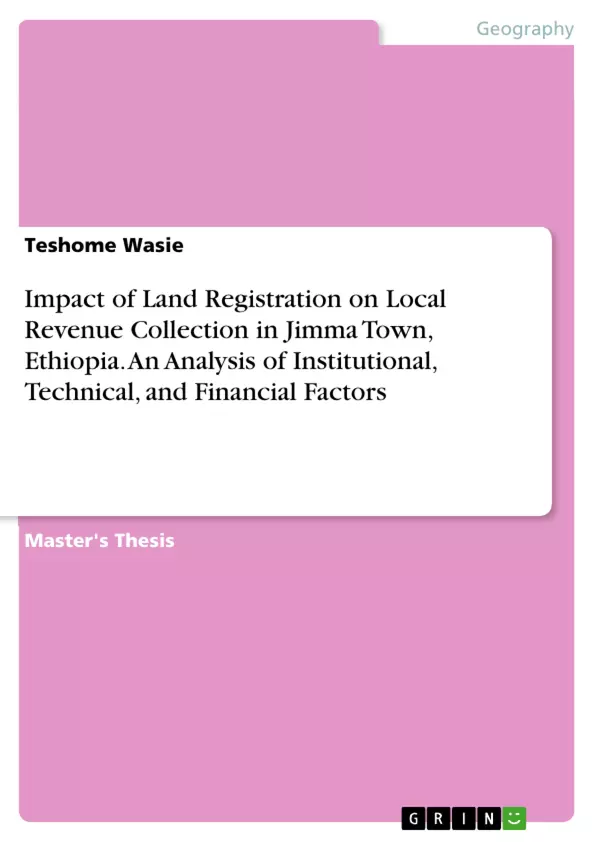This study assesses the impact of the land registration system on local revenue collection within Jimma City Administration. Emphasizing the significance of registering land and land-related properties, the research examines how such registration can enhance land management, foster development, and generate substantial land-related revenue. The study has three key objectives: firstly, identifying institutional, technical, financial, and motivational factors in the land registration system; secondly, analyzing mechanisms for improving the land registration system; and thirdly, examining the relationship between land registration and tax revenue.
The research employs a probability sampling method, and the findings reveal that a significant percentage of the sampled respondents (86%) possess knowledge about land registration. Additionally, experts in the field acknowledge the importance of land registration for revenue collection in the study area. The study underscores a complementary relationship between land registration and revenue collection, and it traces the trends of revenue change attributed to the land registration system. Furthermore, the introduction of a cadastral system is shown to have a positive impact on revenue collection.
Inhaltsverzeichnis (Table of Contents)
- Acknowledgment
- Table of Content
- List of Acronyms
- CHAPTER ONE
- 1. INTRODUCTION
- 1.1 Background of the study
- 1.2. Statement of the problem
- 1.3.1 General objective
- 1.3.2 Specific objectives
- 1.4 Research question
- 1.5. Significance of the study
- 1.6 Scope of the study
- 1.7 Limitation of the Study
- 1.7.1 Operational Definition of Key Term
- 1.7.2 Land registration
- 1.7.3 Revenue collection
- 1.8 Organization of the Thesis
- CHAPTER TWO
- 2. LITERATURE REVIEW
- 2.1. Land
- 2.1.2. Unique feature of land
- 2.1.3. Real property
- 2.1.4. Land Tenure
- 2.1.5. Land parcel information
- 2.1.6. Land registration
- 2.2. Cadasters and land registration
- 2.2.1 History of Deed Registration and Title Registration
- 2.2.2. peri-urban
- 2.3.3. Land Registration processes in Peri-Urban Areas
- 2.2.4. Availability of Information
- 2.2.5. Allocation of Adequate Resources
- 2.2.6. Administrative System
- 2.2.7. Competition and Conflict
- 2.2.8. Land Registration Processes
- 2.2.9 Revenue
- 2.3. land registraetion practice in the world
- 2.3.1 Land registration in Egypt and Rome
- 2.3.2 Review and analysis of land registration in Ethiopia
- 2.3.3. Property taxtion in Ethiopia
- 2.3.4 Rural Land Registration and Certification Programme in Ethiopia
- 2.3.5. Ethiopia Lands Policy and Reform
- 2.4. Institutional and Organizational Capacity
- 2.5. Inadequate Institutional Capacity of Land Administration
- 2.6. Land Policy Implementation in Oromia National Regional State
- 3. RESEARCH METHODOLOGY
- 3.1. Description of the Study Area
- 3.1.1 Location
- 3. 1.2 Agro-ecology and climate
- 3.1.3 Topography
- 3.1.4 Demographic Characteristics
- 3.1.5 Socio-economic and infrastructure Characteristics
- 3.2 Research Approaches
- 3.2.1 Research Design
- 3.3 Data collection instruments
- 3.3.1 Questionnaire
- 3.3.2 Interview
- 3.3.3. Observation
- 3.4. Sample Design
- 3.4.2. Sampling Frame
- 3.4.3. Sampling Units
- 3.4.4. Sampling Techniques
- 3.5. Sample size determination
- 3.6. Sources of Data
- 3.6.1. Primary data sources
- 3.6.2. Secondary data sources
- 3.7 Data Presentation Method
- 3.8 Data Analysis
- 3.9 Ethical Consideration
- CHAPTER FOUR
- CHAPTER FIVE
- References
- Impact of land registration on revenue collection in Jimma Town
- Factors affecting revenue collection in the context of land registration
- The role of land registration in promoting efficient revenue generation
- Challenges and opportunities associated with land registration for revenue collection
- Recommendations for improving land registration systems and revenue collection practices
- Chapter One: Introduction - This chapter provides an overview of the research, including the background of the study, statement of the problem, research objectives, research questions, significance of the study, scope of the study, and limitations of the study. It also defines key terms, such as land registration and revenue collection.
- Chapter Two: Literature Review - This chapter explores relevant literature on land, land tenure, cadastral systems, land registration practices, and their relationship to revenue collection. It provides a comprehensive review of existing research on land registration in Ethiopia and around the world.
- Chapter Three: Research Methodology - This chapter outlines the research methodology, including the study area, research design, data collection instruments, sampling techniques, data sources, data analysis methods, and ethical considerations.
Zielsetzung und Themenschwerpunkte (Objectives and Key Themes)
This research proposal aims to assess the impact of land registration on revenue collection in Jimma Town, Jimma Zone, Oromia Regional State, Ethiopia. The study intends to understand the current state of land registration practices, identify factors affecting revenue collection, and analyze the correlation between land registration and revenue generation.
Zusammenfassung der Kapitel (Chapter Summaries)
Schlüsselwörter (Keywords)
The primary focus of this research is on land registration, revenue collection, and their relationship within the context of urban and regional development planning in Jimma Town, Ethiopia. Key terms and concepts include land tenure, cadastral systems, property taxation, land administration, institutional capacity, and policy implementation.
- Quote paper
- Teshome Wasie (Author), 2020, Impact of Land Registration on Local Revenue Collection in Jimma Town, Ethiopia. An Analysis of Institutional, Technical, and Financial Factors, Munich, GRIN Verlag, https://www.grin.com/document/1399795



